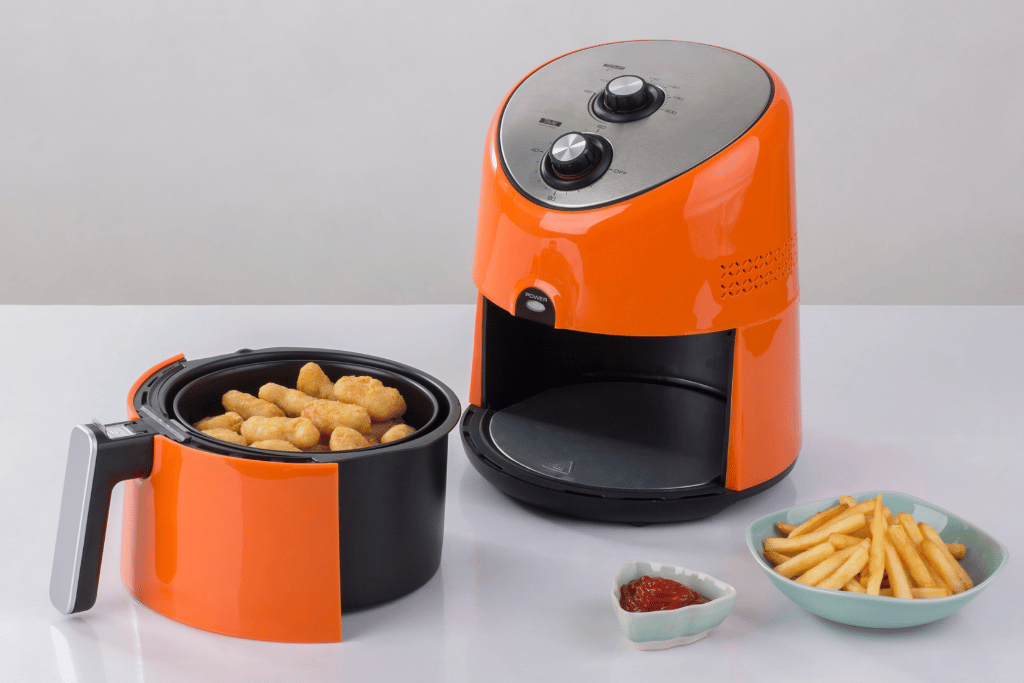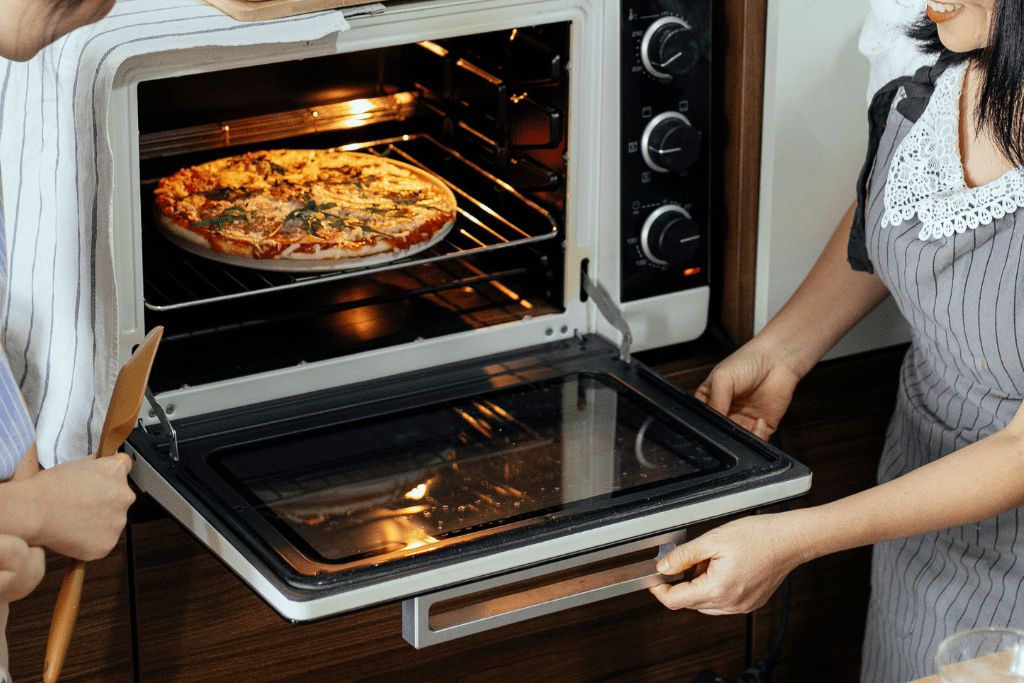
An air fryer is like a magic kitchen gadget that cooks food by swirling hot air around it. People are talking a lot about these fryers lately. Some say they’re amazing, while others think they’re just a fancy trick.
In this article, we’ll explore the truth behind the trend “Are air fryers a gimmick or a valuable addition to the kitchen? Exploring their benefits, limitations, and expert opinions, we aim to uncover the truth about these trendy cooking appliances.
Understanding Air Fryers: Key Insights
Let’s have a look at detailed key insights of an air fryer:
A) Cooking Capabilities
- Frozen Favorites: Air fryers excel with frozen foods like chicken wings, mozzarella sticks, and French fries.
- Versatile Cooking: Beyond frozen items, air fryers can handle roasted veggies, homemade chips, and even desserts like cookies or muffins.
- Baking Abilities: They’re not just for frying; air fryers can also be used for baking various dishes.
B) Health and Nutritional Considerations
- Reduced Oil Usage: Air fryers use minimal oil compared to traditional frying methods, promoting healthier cooking.
- Oil Selection Impact: Choosing healthier oils like olive or avocado oil can further enhance the nutritional value of air-fried foods.
- Existing Fat Content: Many frozen foods already contain fats; hence, while air frying is healthier than deep frying, it might not eliminate fats entirely.
C) Operational Aspects

- Cooking Efficiency: Air fryers generally cook faster than traditional ovens due to their smaller size and rapid air circulation.
- Temperature Control: Precise temperature settings in air fryers offer better cooking control, allowing adjustment according to various food requirements.
- Energy Efficiency: They consume less energy compared to larger ovens, making them more eco-friendly, especially for smaller portions.
- Ease of Maintenance: Cleaning an air fryer is often simpler due to non-stick coatings and dishwasher-safe components.
- Learning Curve: While user-friendly, achieving the perfect results might require some experimentation and familiarity with the appliance.
D) Practical Considerations
- Quantity Management: Overcrowding the fryer can result in uneven cooking and soggy food, so it’s best to cook in batches within the basket’s capacity.
- Counter Space and Size: They require valuable counter space and are larger than standard toasters, a factor to consider in kitchen placement.
- Price Range: Air fryers range in price from $100 to $300 based on features and size.
- Ease of Use: No specific culinary skills are required; air fryers are plug-and-use appliances with straightforward instructions.
Do Air Fryers Fry?
Air fryers, despite their name, don’t technically fry food. They operate more like compact convection ovens, cooking food quickly with a unique method.
Equipped with a heating mechanism and a fan for efficient circulation, an air fryer creates an environment where hot air swiftly moves around and envelops the food placed in its fryer basket. This rapid air circulation is what gives the food its crispy, golden-brown exterior, akin to the effect achieved through deep frying.

One significant advantage is the reduction of excess fat, as the extra oils or fats from the food typically drip into a pan that’s easy to clean and often dishwasher-safe. This makes the cooking process healthier by eliminating the need for high-calorie oils.
Air fryers indeed provide a similar crispiness to traditionally fried food, though the taste might not be exactly the same, but pretty close. They achieve this without the excessive use of high-fat oils by simply brushing a light coat of oil on the food, primarily to remove moisture and maintain low-fat levels during cooking.
Are Air Fryers A Gimmick?
The concept of air fryers can be seen as a bit gimmicky, but they do offer distinct advantages. They use hot air circulation to cook food, providing a healthier alternative to deep frying by reducing oil usage.
While they may not perfectly replicate the taste and texture of deep-fried foods, they come quite close and offer versatility in cooking various dishes.
However, they have limitations, such as not being ideal for liquid batter frying and requiring careful batch management to avoid uneven cooking.
So, while there’s a bit of a marketing allure to air fryers, they do serve a purpose and can be a valuable addition to a kitchen, especially for those seeking healthier cooking options.
Explore the compatibility of Ceramic Coatings with Air Fryer “Can You Put Ceramic in an Air Fryer?”
Pros of Air Fryers:

Let’s look at why many folks love air fryers:
- Healthy Cooking: Air fryers need very little oil to make crispy, yummy food. That means fewer calories and less fat, which can be better for your health.
- Quick and Easy: They’re super easy to use. You just pop your food in, set the time and temperature, and voila! It cooks way faster than traditional ovens.
- Versatile: Air fryers aren’t just for fries! You can cook all sorts of things in them—chicken, veggies, even cakes! They’re like mini all-in-one cookers.
- Less Mess: Cleaning up is a breeze. Most air fryers have parts you can just pop in the dishwasher. No messy oil splatters to deal with.
- Kid-Friendly: Because they’re safer than deep fryers, they’re great for families. Kids can even help out with cooking using these.
Cons of Air Fryers:
But, just like anything else, air fryers have their downsides too:
- Limited Space: Some air fryers aren’t big enough for larger meals. If you’re cooking for a bunch of people, you might have to do it in batches.
- Taste Differences: While they make food crispy, some people think air-fried food tastes a bit different from traditionally fried food. It’s still yummy, just a tad different.
- Learning Curve: Sometimes figuring out the right time and temperature for different foods can take a bit of trial and error. It might not be perfect the first time.
Comparative Analysis:

Let’s see how air fryers stack up against traditional cooking methods:
- Cooking Time:
- Air Fryer: Air fryers usually cook faster than ovens. They can crisp up food in less time, making them great for quick meals.
- Traditional Methods: Ovens or stovetop cooking might take longer, especially for crispy results.
- Taste:
- Air Fryer: While air fryers make food crispy, some notice a slight difference in taste compared to deep-frying. It’s good but might not be identical.
- Traditional Methods: Deep-frying or oven baking might provide a more familiar taste but with more oil usage.
- Health Aspects:
- Air Fryer: Using significantly less oil, air fryers offer a healthier option for crispy dishes. They reduce calorie and fat intake, making them popular among health-conscious individuals.
- Traditional Methods: Deep-frying can make food tasty but also adds more oil and calories to your meals.
Expert Opinions and Research:
- Research Studies: Some studies suggest that air frying can significantly reduce the formation of harmful compounds compared to deep-frying, making it a healthier choice.
- Chef Opinions: Chefs often appreciate air fryers for their ability to crisp food without excessive oil. However, some believe that certain foods might not achieve the same results as traditional methods in terms of taste and texture.
Is An Air Fryer Worth It?
Whether an air fryer is worth it depends on your cooking preferences and lifestyle. They offer a convenient and healthier way to cook crispy foods with less oil compared to traditional frying methods.
If you enjoy crispy textures and want to cut down on oil usage while still enjoying fried-like dishes, an air fryer can be a worthwhile addition to your kitchen.
Additionally, they’re versatile and can cook a variety of foods quickly. However, if you’re content with your current cooking methods or don’t often crave crispy foods, it might not be a necessary investment. Ultimately, it comes down to personal preference and cooking habits!
Is the Blackstone Air Fryer Worth It? Analysis & Insights 2023
Final Words
So, are air fryers just a passing gimmick or a valuable addition to the kitchen? The answer might not be straightforward.
Whether air fryers are a gimmick or a practical tool boils down to individual needs and preferences. They offer a different way of cooking—healthier and faster for some dishes—but they might not suit everyone’s taste or cooking style.
So, are air fryers a gimmick? It seems they’re more of a mixed bag—offering benefits but not a one-size-fits-all solution. Consider your cooking habits, preferences, and health goals to decide if an air fryer truly fits into your kitchen routine.
FAQs
Is air fry a gimmick?
The perception varies. While some consider them a practical kitchen tool for healthier cooking and convenience, others label them as a passing trend due to taste differences and cooking limitations.
Do professional chefs use air fryers?
Some professional chefs appreciate air fryers for specific dishes or healthier cooking options, but opinions vary, and not all chefs incorporate them into their professional kitchens.
Do I need an air fryer if I have an oven?
Having an oven covers many cooking needs, but an air fryer offers quicker, healthier cooking for certain foods, making it a valuable addition depending on individual cooking preferences and habits.
Can children use air fryers safely?
Air fryers are generally safer than traditional deep fryers, making them suitable for families, but supervision is always recommended, especially for younger children.
What is the downside of an Airfryer?
The limitations include smaller cooking space for larger meals, potential taste differences compared to deep-fried food, and a learning curve in finding the right cooking settings.
What is the controversy with air fryers?
The controversy revolves around whether they truly replicate the taste of deep-fried food and if their benefits outweigh the slight differences in taste and cooking methods.